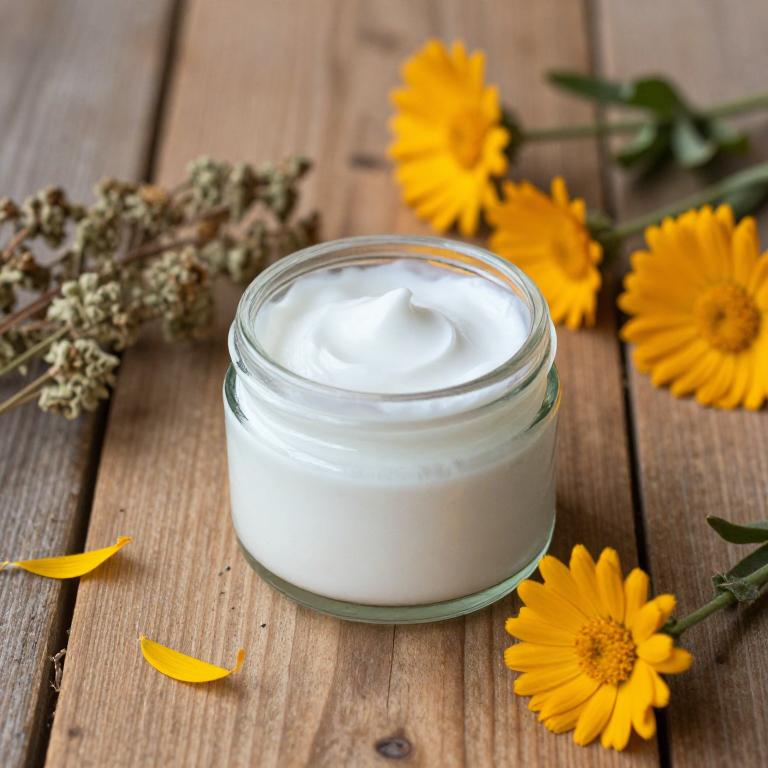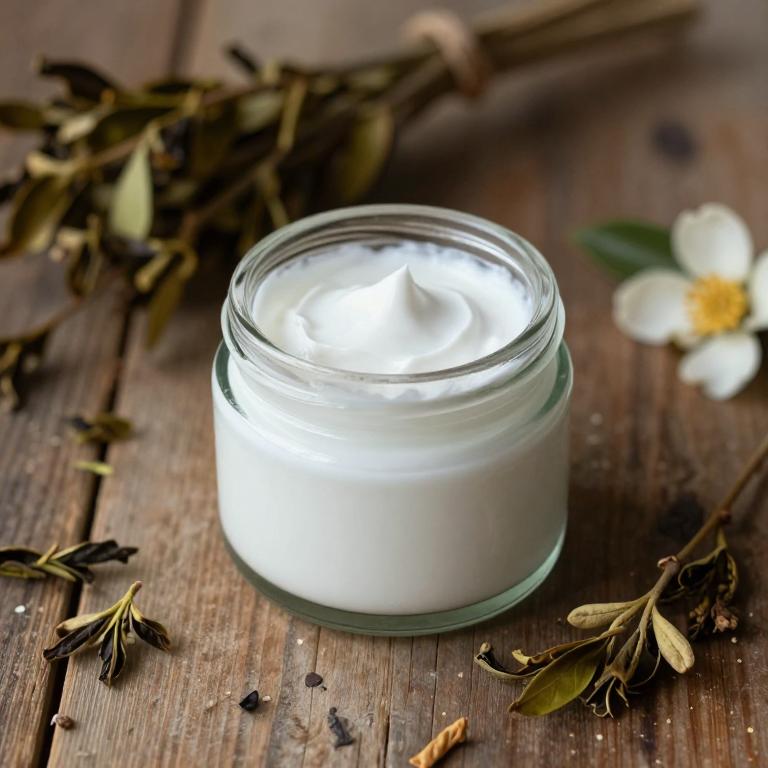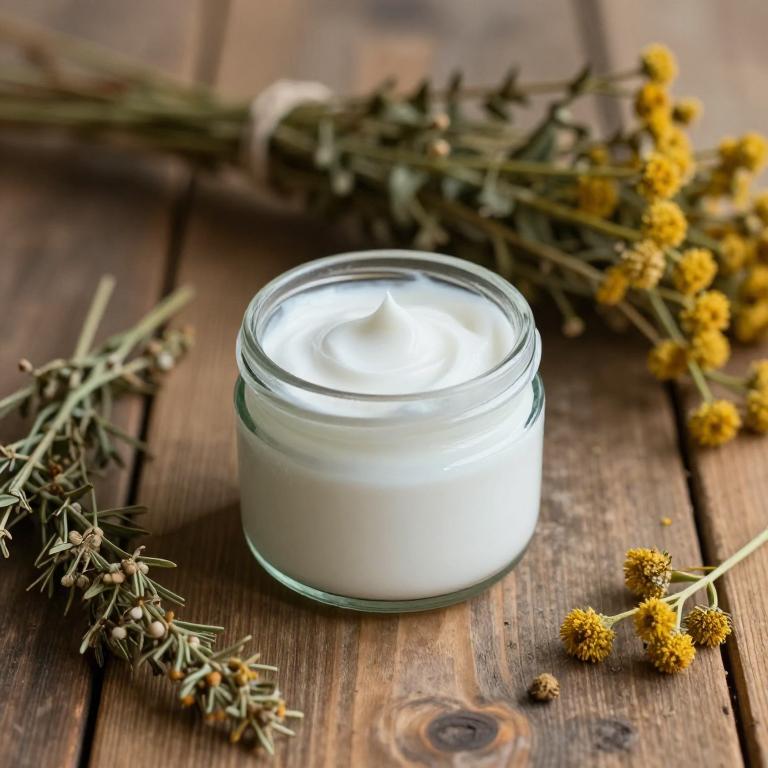10 Best Herbal Creams For Cold Sore

Herbal creams for cold sores are natural topical treatments that often contain ingredients like tea tree oil, aloe vera, or chamomile, which are known for their soothing and anti-inflammatory properties.
These creams are designed to alleviate the pain, redness, and swelling associated with cold sores caused by the herpes simplex virus. Many herbal options are preferred by individuals seeking alternative or complementary treatments to over-the-counter or prescription medications. They can help speed up the healing process and reduce the likelihood of scarring.
However, it is important to consult a healthcare provider before using herbal creams, especially if you have sensitive skin or are taking other medications.
Table of Contents
- 1. Ginger (Zingiber officinale)
- 2. St. john's wort (Hypericum perforatum)
- 3. Echinacea (Echinacea purpurea)
- 4. English lavender (Lavandula angustifolia)
- 5. Marigold (Calendula officinalis)
- 6. Aloe vera (Aloe barbadensis)
- 7. Dog rose (Rosa canina)
- 8. Camellia (Camellia sinensis)
- 9. Lemon balm (Melissa officinalis)
- 10. Chaste tree (Vitex agnus-castus)
1. Ginger (Zingiber officinale)

Zingiber officinale, commonly known as ginger, has been traditionally used for its anti-inflammatory and antiviral properties, making it a popular ingredient in herbal creams for cold sores.
These creams often contain ginger extract, which may help reduce the pain, swelling, and duration of cold sore outbreaks. The warming sensation provided by ginger can also promote blood circulation, aiding in the healing process. While some studies suggest that ginger may have potential benefits for oral herpes, more research is needed to confirm its efficacy.
As with any topical treatment, it is advisable to consult a healthcare professional before using ginger-based creams, especially if you have sensitive skin or underlying health conditions.
2. St. john's wort (Hypericum perforatum)

Hypericum perforatum, commonly known as St. John's Wort, is often used in herbal creams to treat cold sores due to its anti-inflammatory and antiviral properties.
These creams typically contain extracts of the plant's leaves and flowers, which may help reduce the duration and severity of cold sore outbreaks. While some studies suggest that St. John's Wort can be effective in alleviating symptoms, its use should be approached with caution due to potential interactions with other medications. The application of these creams usually involves gently applying a thin layer to the affected area several times a day.
However, it is important to consult with a healthcare provider before using St. John's Wort cream, especially if you are taking other medications or have underlying health conditions.
3. Echinacea (Echinacea purpurea)

Echinacea purpurea, commonly known as purple coneflower, is a popular herbal remedy often used in creams to help alleviate symptoms of cold sores caused by the herpes simplex virus.
These creams typically contain extracts of echinacea, which are believed to have anti-inflammatory and antiviral properties that may reduce the duration and severity of cold sore outbreaks. While some studies suggest that echinacea might support the immune system, its effectiveness in treating cold sores remains a topic of debate among researchers. When using echinacea-based creams, it is important to follow the manufacturer's instructions and consult with a healthcare provider, especially if you have sensitive skin or are taking other medications.
Overall, echinacea purpurea herbal creams may offer some relief for cold sores, but they should not replace medical treatment for severe or recurrent infections.
4. English lavender (Lavandula angustifolia)

Lavandula angustifolia, commonly known as English lavender, is often incorporated into herbal creams for its soothing and anti-inflammatory properties.
These creams are popular for their potential to alleviate the discomfort associated with cold sores, which are caused by the herpes simplex virus. The essential oils in lavender, such as linalool and lavandins, may help reduce pain, swelling, and the duration of cold sore outbreaks. While scientific evidence supporting its efficacy is limited, many users report relief from applying lavender-infused creams topically.
As a natural remedy, lavender-based creams are generally safe for most skin types and can be used as a complementary treatment alongside conventional medical care.
5. Marigold (Calendula officinalis)

Calendula officinalis, commonly known as pot marigold, is often used in herbal creams to help soothe and heal cold sores.
These creams typically contain calendula extract, which is known for its anti-inflammatory and antimicrobial properties. When applied topically, calendula can help reduce redness, swelling, and irritation associated with cold sores. Some studies suggest that calendula may also promote faster healing by supporting skin regeneration.
However, it is important to note that while calendula may offer some relief, it is not a cure for cold sores, and consulting a healthcare professional is recommended for persistent or severe cases.
6. Aloe vera (Aloe barbadensis)

Aloe barbadensis, commonly known as aloe vera, is often incorporated into herbal creams for the treatment of cold sores due to its soothing and healing properties.
These creams typically contain a combination of aloe vera gel, which has anti-inflammatory and antimicrobial effects, along with other natural ingredients like beeswax, vitamin E, and essential oils. The cooling effect of aloe vera can help reduce the pain and discomfort associated with cold sores, while its moisturizing properties promote faster healing of the affected area. Many people find these herbal creams to be a gentle and natural alternative to conventional treatments, especially for those seeking to avoid harsh chemicals.
However, it is important to consult a healthcare professional before using any herbal remedy, especially if the cold sore is severe or persistent.
7. Dog rose (Rosa canina)

Rosa canina, also known as dog rose, is a traditional herbal remedy that has been used for centuries to support skin health and healing.
Rosa canina herbal creams are often formulated with extracts from the fruit and flowers of the Rosa canina plant, which are rich in vitamins, antioxidants, and essential fatty acids. These creams are commonly used to soothe and treat cold sores, which are caused by the herpes simplex virus. The anti-inflammatory and antiviral properties of Rosa canina may help reduce the duration and severity of cold sore outbreaks.
When applied topically, these creams can provide relief from the pain, redness, and discomfort associated with cold sores, promoting faster healing and skin regeneration.
8. Camellia (Camellia sinensis)

Camellia sinensis, the plant from which green tea is derived, is increasingly being incorporated into herbal creams formulated to treat cold sores.
These creams often contain extracts rich in antioxidants and anti-inflammatory compounds that may help reduce the duration and severity of cold sore outbreaks. The active components in Camellia sinensis, such as catechins, are believed to have antiviral properties that could inhibit the herpes simplex virus. While some studies suggest potential benefits, more research is needed to confirm their efficacy.
As a natural alternative, these creams may offer a gentler option for those seeking to manage cold sores without harsh chemicals.
9. Lemon balm (Melissa officinalis)

Melissa officinalis, commonly known as lemon balm, is a popular herbal ingredient used in the formulation of creams for treating cold sores.
These creams often contain extracts of lemon balm, which are believed to have antiviral and soothing properties that may help reduce the duration and severity of cold sore outbreaks. The active compounds in lemon balm, such as rosmarinic acid and flavonoids, are thought to inhibit the replication of the herpes simplex virus, which causes cold sores. When applied topically, these herbal creams can provide a calming effect, easing the discomfort and irritation associated with cold sores.
However, it is important to consult a healthcare professional before using any herbal remedy, especially if you have allergies or are taking other medications.
10. Chaste tree (Vitex agnus-castus)

Vitex agnus-castus, commonly known as chasteberry, is often used in herbal creams for cold sores due to its potential anti-inflammatory and antiviral properties.
These creams typically contain extracts of vitex agnus-castus combined with other soothing ingredients like aloe vera or chamomile to enhance their effectiveness. While some studies suggest that vitex may help reduce the duration and severity of cold sores, more research is needed to confirm its efficacy. Herbal creams with vitex agnus-castus are generally considered safe for topical use, though they may not be suitable for everyone, especially those with known allergies.
As with any herbal remedy, it's advisable to consult a healthcare professional before use, especially if you have underlying health conditions or are taking other medications.